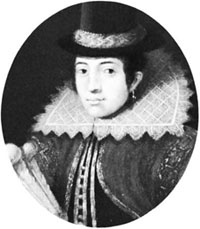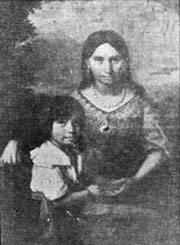影片對白 So, maybe make sure you don't keep disappointing the wrong people.
影片簡介 Only when Michael begins to realize that the he has lost control of his life and the remote is now programming him does he finally learn that life is as much about the moments he'd rather forget as it is the moments he will always remember.
考考你 一展身手
4. Work one's ass off
這個片語的意思是 work hard,例如:He’s working his ass off so he can buy the dream house.
5. Give someone a break
Give someone a break 在這里的意思是“Stop trying to fool or upset or bother someone”,例如:Don't tell me the party's been postponed again--give me a break! 這個片語通常表達的是一種帶有滑稽意味的憤努。
6. Sneak up
這個片語的意思是“advance stealthily or unnoticed鬼鬼祟祟、偷偷摸摸地行事”,例如:Age creeps up on you.
7. Bite one's ass
這是一個很粗俗的口語表達,它的寓意是當(dāng)一個人比別人要差時(比如經(jīng)濟條件等),差的人會 bite other’s ass。例如: John just bought a new Cadillac. His neighbor bit his ass hard.
文化面面觀
印第安公主——Pocahontas
因了迪士尼的同名電影,Pocahontas的名字開始被大眾所知。但歷史和藝術(shù)改編總是存在著偏差。下面就讓我們來了解一下這位印第安公主的真實人生吧。

|
| Pocahontas, detail of a portrait by an unknown artist, 1616. |
Pocahontas (c. 1596-1617), Indian "princess." Reputedly the favorite daughter of the Algonquin chief Powhatan, Pocahontas contributed significantly to the early survival of the Jamestown colony and played a brief but dramatic role in English imperial propaganda. Her untimely death cut short her successful mediation between the Powhatan Indians and the colony. Both before her intercession and long after her death, Jamestown--the first permanent English outpost in North America--was precarious, largely because of Indian hostility to the colony and its expansion.
Pocahontas's contributions to Jamestown date from her early acquaintance with Capt. John Smith after his capture by Powhatan's men in 1607. Her legendary rescue of the English captain on the verge of his execution was probably part of a traditional Indian adoption ceremony (misinterpreted or misunderstood by Smith), though it is possible that without her intercession he would have been killed. In any event, relations between Powhatan and the fledgling colony improved, and Pocahontas, then about twelve years old, became a frequent visitor at Jamestown and an important supplier of food for the colonists. She also became an informer for the colony, warning Smith of her father's belligerent plans.
After Smith's return to England, Pocahontas disappears for several years from the historical record. She may have married an Indian, resumed her proper name of Matoaka ("Pocahontas" was a nickname), and shunned the English, who, under Sir Thomas Dale, were at war with Powhatan. To force Powhatan's submission, Capt. Samuel Argall in 1613 lured Pocahontas on board a ship and held her hostage. During a prolonged captivity, she was converted to Christianity by the Reverend Alexander Whitaker and baptized as "Rebecca." In 1614 she married John Rolfe, a prominent colonist and recent widower. Powhatan grudgingly agreed to a truce with the colony that lasted until 1622.

|
| Pocahontas and her son |
The Virginia Company of London quickly recognized Pocahontas's enormous propaganda value as an example of Anglo-Indian harmony, of missionary success among the natives, and of the prospect that Indians could be persuaded to adopt English ways. To attract new settlers and fresh investments, the company in 1616 brought the Rolfes, their son, Thomas (b. 1615), and an entourage of a dozen or so Indians to England. She met many of the era's major figures, was presented at court, and had her portrait painted. She also took ill, probably from diseases that had no American counterpart. Pocahontas died in March 1617, after boarding ship for a return to Virginia, and was buried in Gravesend, England. With the death of Pocahontas and, soon after, of Powhatan, the fragile peace between colonists and Indians eroded. Ironically, the Indians' major grievance was the colonists' insatiable demand for land, triggered principally by windfall profits from the tobacco species introduced by John Rolfe.
In the public mind, Pocahontas is linked especially, and often romantically, with Smith. The rescue episode did not appear in Smith's accounts of Virginia published in 1608 and 1612 but surfaced in his Generall Historie of Virginia, New England, and the Summer Isles (1624). Doubts have been cast ever since on its authenticity and, if true, its meaning. Ethnographers and historians now generally agree that the event could well have taken place and that Smith's reasons for suppressing the story until 1624 had more to do with Pocahontas's early obscurity than with literary invention.
影片對白 So, maybe make sure you don't keep disappointing the wrong people.
影片簡介 Only when Michael begins to realize that the he has lost control of his life and the remote is now programming him does he finally learn that life is as much about the moments he'd rather forget as it is the moments he will always remember.
考考你 一展身手